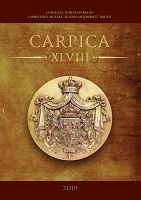Câteva consideraţii privind domnia lui pătraşcu cel bun în ţara românească (1554-1557)
Some considerations regarding the Reign of Pătraşcu the Good in Wallachia (1554-1557)
Author(s): Laurențiu ChiriacSubject(s): Christian Theology and Religion, Political history, 16th Century, The Ottoman Empire
Published by: Complexul Muzeal “Iulian Antonescu” Bacău
Keywords: Wallachia; ruler; Pătrașcu the Good; Ottoman Empire;
Summary/Abstract: From the second half of the sixteenth century, a period of instability begins regarding the running of the Wallachia, reflected – on the one hand – by the increasingly pressing political and military influence of the Ottoman Porte on Wallachia, and – on the other hand – by the multitude of intrigues and gossip about the members of the ruling boyar families. In this general context, the reign of Pătrașcu the Good also took place between 1554-1557. Pătrașcu the Good was the son of Radu Paisie and was considered a man of the Turks. At the request of the Ottomans, he went with his military troops to Transylvania (1556), to restore to the throne Ioan Sigismund – who, together with his mother, Queen Isabella, has been forced to retire to Poland. He was called „the Good” by historians, because he had a peaceful reign, without killing any boyar. From the economic and social point of view, Pătrașcu the Good’s reign was stable for the Wallachia, allowing the trade and handcrafts to develop normally, and the number of population increased. On the cultural level, a slight development was observed, by the appearance of many Orthodox religious books and by the foundation of new places of worship. Pătrașcu the Good was buried at Dealu Monastery, near the grave of his grandfather, Radu the Great, because his father’s grave (exiled in Egypt) was too far away from the country.
Journal: Carpica
- Issue Year: 2019
- Issue No: XLVIII
- Page Range: 96-103
- Page Count: 8
- Language: Romanian

